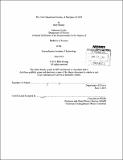The first educational exodus : a narrative of 1965
Author(s)
Huang, Billy
DownloadFull printable version (3.332Mb)
Other Contributors
Massachusetts Institute of Technology. Department of Humanities, Arts, and Social Sciences. History Section.
Advisor
Craig Steven Wilder.
Terms of use
Metadata
Show full item recordAbstract
Histories of Boston's school desegregation crisis have focused on the legal and political struggles that preceded the Garrity decision, which, in 1974, enforced citywide school integration. It is necessary to discern and evaluate the viewpoints of black and white parents in the greater Boston area in the years before court-mandated integration. This thesis examines the black community's efforts to assure higher quality education for their children through public protests and self-help actions. It also explores the responses of urban and suburban white residents to this rising civil rights challenge. Black parents created Operation Exodus, a grassroots movement aimed at enrolling Roxbury children in other Boston schools, in response to the Boston School Committee's reluctance to build better schools and integrate existing schools. Led by a group of prominent black activists, Exodus members found allies within and beyond Roxbury. From 1965-1970, Exodus rallied the black community to not only demand better education, but also to develop more effective social agencies in Roxbury. The movement eventually inspired similar programs, such as METCO, in the suburbs. Although the Exodus movement was eventually superseded by national efforts to integrate Boston's schools, it played a key role in shaping public opinion about school desegregation and publicizing the failures of the Boston school system.
Description
Thesis (S.B. in History)--Massachusetts Institute of Technology, Dept. of Humanities, 2013. Cataloged from PDF version of thesis. Includes bibliographical references (p. 68-71).
Date issued
2013Department
Massachusetts Institute of Technology. History Section; Massachusetts Institute of Technology. Department of HumanitiesPublisher
Massachusetts Institute of Technology
Keywords
Humanities, Arts, and Social Sciences. History Section.